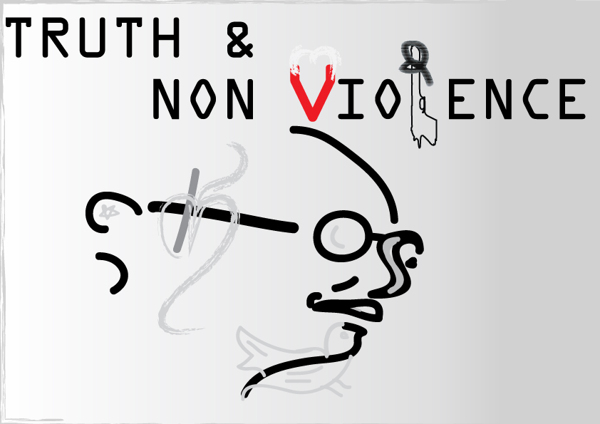Truth and Nonviolence
by Nirmal Kumar Bose

Illustration art courtesy behance.net
Editor’s Preface: This article is the text of a speech delivered at the World Pacifist meeting in Shantiniketan, India, 1-5 December 1949, and continues our War Resisters’ International archive series. Nirmal Kumar Bose was an important figure in Gandhi’s life in the 1930s and 40s, and the author of an important diary of his life in Gandhi’s ashrams. For more biographical details please see the Editor’s Note at the end, along with an archive reference and a link to a pdf reproduction of the entire, original article. JG
India has tried to follow the principles of satya and ahimsa, truth and nonviolence, through centuries of her history. The actual application of these concepts has varied over the centuries and they have also been successfully employed in the solution of numerous problems relating to personal life or even group-life, where the group was based upon common religious experience.
Mahatma Gandhi drew his inspiration from the deep wells of Indian tradition and insisted upon the application of age-old methods to the problems of modern Indian life. According to him, this was the most civilized thing to do. As he wrote:
Some friends have told me that truth and nonviolence have no place in politics and worldly affairs. I do not agree. I have no use for them as a means of individual salvation. Their introduction and application in everyday life has been my experiment all along. (1)
We have to make truth and nonviolence matter not for mere individual practice but for practice by groups and communities and nations. That at any rate is my dream. I shall live and die in trying to realize it. My faith helps me to discover new truths every day. Ahimsa is the attribute of the soul and therefore to be practised by everybody in all the affairs of life. If it cannot be practised in all departments it has no practical value. (2)
Self-government depends entirely upon our own internal strength, upon our ability to fight against the heaviest odds. Indeed, self government which does not require that continuous striving to attain it and to sustain it, is not worth the name. I have therefore endeavoured to show both in word and deed, that political self-government— that is, self-government for a large number of men and women—is no better than individual self-government and, therefore, it is to be attained by precisely the same means that are required for individual self-government or self-rule. (3)
Gandhiji also wrote at another time that he was a believer in war, but war which was carried on by means of nonviolence. This was as different from ‘passive resistance’ as the North Pole is from the South Pole. It is the purpose of the present article to present in outline the high points of Gandhiji’s efforts in this direction and thus to show how he tried to fashion a tool of wide-spread social application out of materials that had been lying rusting in the world’s private armoury.
Now that Gandhiji is no longer with us, it has become all the more necessary to examine what exactly he stood for. If we are to carry on the brave experiments, which were initiated by him, we must know the full meaning of his ideals, as well as acquaint ourselves with the methods he used to realize them.
Endnotes: (NKB)
(1) BOSE, Nirmal Kumar, Selections from Gandhi, Ahmedabad: Navajivan Press, 1948; selection # 127.
(2) Ibid, # 128.
(3) Ibid, # 139.
Read the pdf of the complete article here: Truth and Nonviolence
Reference: IISG/WRI Archive Box 62: Folder 1. We are grateful to WRI/London and their director Christine Schweitzer for their cooperation in our WRI project.
EDITOR’S NOTE: Nirmal Kumar Bose (1901-1972) was a leading Indian anthropologist and follower of Gandhi. In 1931 he accompanied Gandhi on the Salt March, and was jailed with Gandhi for his participation. In the 1940s he was one of Gandhi’s secretaries. His controversial book, My Days with Gandhi, Calcutta: Nishana Press, 1952, is not well enough known but is a primary resource for information about Gandhi’s experiments with brahmacharya. Bose faithfully records his doubts about Gandhi’s practice late in life of sleeping naked with young women, as a test of brahmacharya, but Bose also gives an accurate and fair record of Gandhi’s defense of himself. My Days with Gandhi is unique among Gandhi studies.




